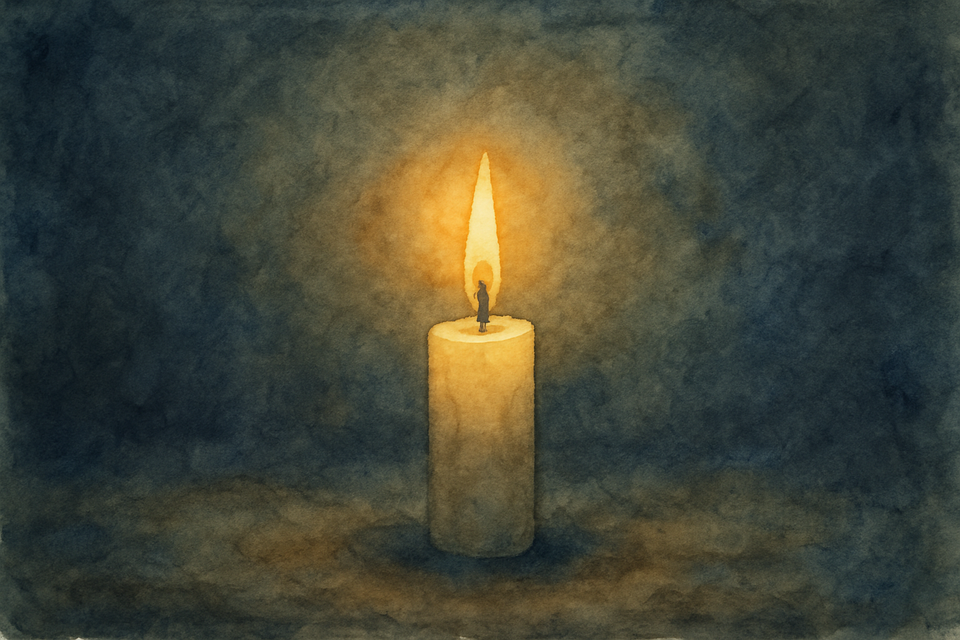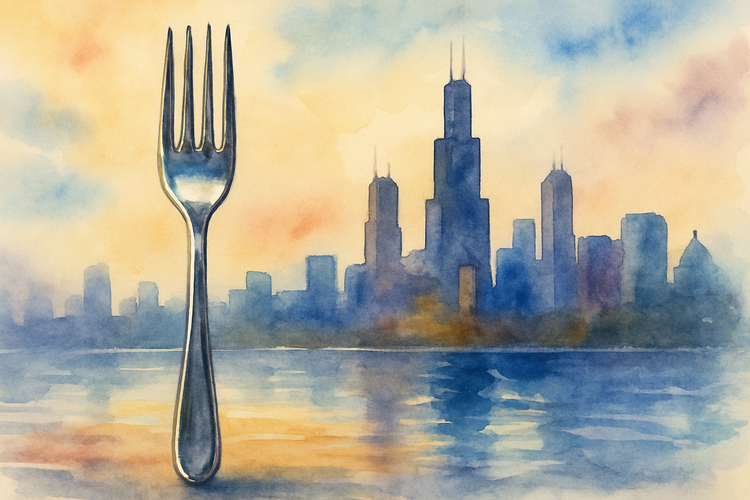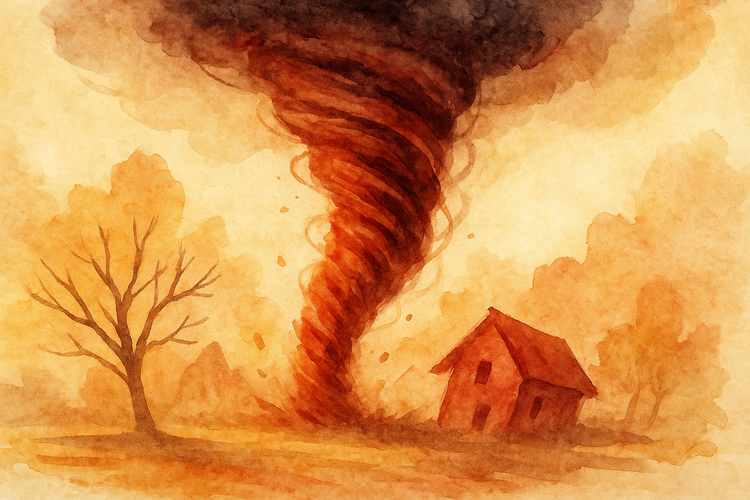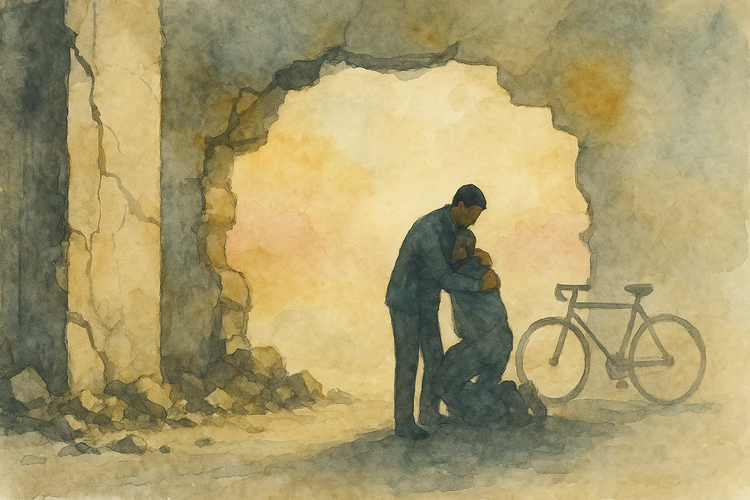The Bear S2E5 "Pop"

Spoilers ahead for Season 2 of The Bear.
Shared Language in the Kitchen
In the opening beats of Pop, we see Tina and Sydney working side by side, testing ideas for the tasting menu. Earth, water, fire — the elements themselves become a shared language, a way for them to bridge gaps in style and experience. For Tina, the collaboration marks how far she has come: once tentative, now able to contribute and converse with real confidence. The moment hints at how culinary school is not just teaching her technique, but also teaching her to connect — to trust her own voice in dialogue with another’s. It is a small but potent image of what this episode keeps circling: that fragile line between retreating into one’s own silence and daring to reach outward.
Building a Kitchen, Building a Chorus
The episode then shifts to the construction site, where Carmy, Richie, and Neil measure out stations on the floor with tape. The room is empty, but their conversation fills it — teasing, testing, and debating how the flow of a kitchen should move. Even here, in what could feel like a hollow and uncertain space, there is connection: the shared dream of how a restaurant might breathe once it is fully alive.
That fragile sense of camaraderie sharpens when Jimmy and Natalie step into the scene. Jimmy’s frustration about money collides with Carmy’s single-minded focus on timing and efficiency, sparking quick exchanges that ring with both familial irritation and genuine investment. Natalie, balancing her brother’s intensity and Jimmy’s financial stake, adds her own dry pragmatism to the mix. The effect is almost musical: overlapping voices, clashing rhythms, but ultimately bound together by a common purpose. In these jagged conversations, the group is reminded that connection often comes not from harmony, but from friction that forces everyone to articulate what they believe in.
Tokens of Trust and Moments of Grounding
From there, the episode narrows back into the kitchen, where connection is forged in subtler gestures. Carmy leaves his knife for Tina — a deeply personal token in the culinary world, signaling trust and recognition. It is not just a tool but a quiet acknowledgment of her growth, a way of saying she belongs here, without the need for words. At the same time, Sydney works to tether Carmy to the present, urging him to pause his distracted planning and look at the table settings she is arranging. Carmy does not dismiss their importance; he simply feels pulled in too many directions, the endless needs of the project scattering his attention. Sydney’s persistence shows how collaboration requires patience with someone carrying too much weight, and how connection sometimes begins by helping another person simply stop and see what is in front of them.
Reaching Out Beyond Work
Connection shifts into a different register when Carmy calls Claire. She meets him to help with an errand, a small favor that opens a wider space for conversation. As they drive, they compare the demands of their jobs — the long hours, the gnarly, draining work that only makes sense if you love it. The exchange is quiet but telling: both recognize in each other the same pull toward difficult vocations, the way devotion to craft can both isolate and bind. For Carmy, who so often keeps his head down, the call itself is already an opening — a deliberate step toward reaching out, toward trusting someone else with the weight he carries.
As the night unfolds, Carmy and Claire circle back to their shared past. She recalls how shy he was in high school, and even now there is a trace of that same hesitation in him, though softened by his growing willingness to let her in. At the party they attend together, that tension plays out in real time — Carmy, still uneasy in crowds, but steadied by Claire’s presence. The setting moves from daylight into darkness, but for him the connection lies in small exchanges, the comfort of a familiar person who knew him before ambition and anxiety hardened into habit. Each moment with Claire pulls him a little further out of isolation, suggesting that even someone consumed by work and perfectionism can risk letting themselves be seen.
Performance, Bravado, and Belonging
The episode widens again through two contrasting performances. At karaoke, Tina takes the microphone and sings with startling beauty. What could have been awkward becomes luminous, a moment where her willingness to step into the spotlight earns her not just applause but belonging. It is connection born of vulnerability, the opposite of Richie’s mantra later in the episode: “I’m not like this because I’m in Van Halen. I’m in Van Halen because I’m like this.” His defiant claim is really a shield, a way of excusing his wildness and insisting on identity through bravado rather than intimacy. Tina opens herself and is met with warmth; Richie asserts himself and remains alone inside his armor. Placed side by side, the scenes highlight two different paths characters take when confronting their own isolation.
The Risk of Turning Outward
The night closes with one more exchange that cuts deeper. Claire, recalling how she learned to manage sad and unruly drunks in college, speaks with the ease of someone used to being around that kind of sadness. Carmy, listening, registers it differently — the mention touches something raw in him, bound to his own family history of addiction and struggle. For once, the silence between them is not isolating but intimate, a recognition that some truths need no elaboration. When they finally kiss, it feels less like a sudden spark than the careful culmination of a long pull toward connection. Carmy is still shy, still wary, but in this moment he risks stepping out of his shell, allowing himself the possibility of closeness without retreat.
Pop threads its way through kitchens, job sites, and gatherings that stretch from daylight into evening to reveal how every character balances on the edge between isolation and connection. Carmy inches toward openness with Claire, Sydney pushes against his distractions to keep their partnership grounded, Tina steps forward and is embraced, while Richie masks his loneliness in bluster and Ibra slips into silence by the lake. Each storyline carries its own rhythm, but together they compose a portrait of how fragile and necessary human connection is, especially in lives defined by work, pressure, and memory. The episode suggests that growth comes not from eliminating solitude, but from choosing, again and again, to risk turning outward.



Comments ()